Angola. On the side of the poorest and marginalised.
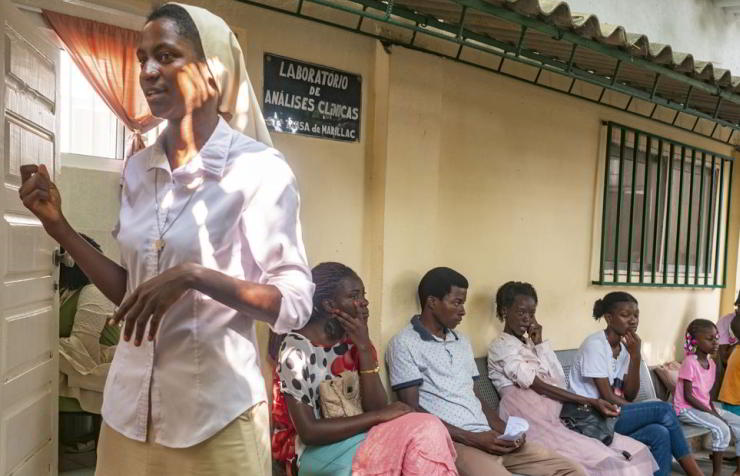
The Vincentian Family in Lobito runs several projects and initiatives in the fields of education, health, training and charity, which give life to thousands of people in the most marginalised areas of this coastal city in Angola. We went to visit them.
We are in Kassai, one of the poorest neighbourhoods of Lobito, in the province of Benguela, on the Atlantic Coast. In the early hours of the morning, the courtyard of the health centre was crowded with many mothers with their babies in their arms.
Sister Lauriete Teresa Sindambo explains that Wednesdays are dedicated to the children’s nutrition programme. The centre supervises about one hundred boys and girls, divided into two groups so that every Wednesday about 50 newborns are seen by a doctor, their weight is monitored and, if necessary, they receive powdered milk and other nutritional supplements. The running of the dispensary, currently directed by Sr. María José Valero, employs 12 people, including health workers, laboratory technicians and service personnel. The centre carries out 40 visits a day, has a laboratory for basic clinical analyses and has different programs for monitoring patients with epilepsy, hypertension and diabetes. Consultations, medications and tests are paid for, but like Sr. Lauriete, “We intervene when we know that people cannot pay”.
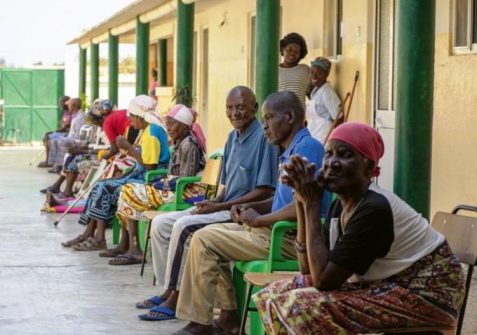
Residents of the nursing home run by the Daughters of Charity in Lobito.
Next to the health centre, the Daughters of Charity also run a home for the elderly. The home is very simple, a central courtyard with several common rooms and double rooms for residents.
There are currently 24 residents, plus 8 service people including entertainers, cooks and laundry staff.
None of the residents can contribute financially. Sister Lauriete, who is in charge of the home, explains that almost all the elderly people they receive are originally from the provinces of Huambo and Bié, who came to Lobito to escape the war. After the war, their relatives returned to their villages, leaving the elderly in Lobito. They were left alone and “this is their home now”.
The school
Seven years ago, the Lay Vincentian Missionaries (MISEVI) opened a community in Lobito, in the Campão neighbourhood. Very soon they started two programmes: Omõla Wasandjuka and Ondjango Yapongololi.
Omõla Wasandjuka, which means ‘happy childhood’ in the Umbundu language, is a family and community intervention programme in three neighbourhoods of Lobito, served by three kindergartens where about 180 children between the ages of three and five attend.
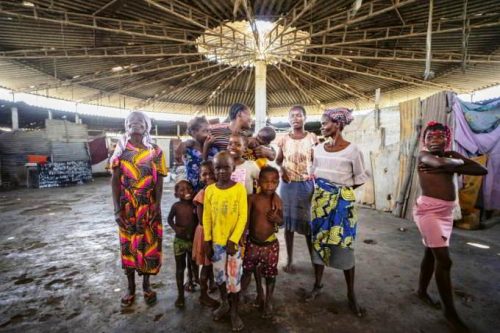
A group of women and children in the old ballroom of the Portuguese colonial fair in the A Feira district, where the Omõla Wasandjuka project is based.
In Angola, only 11% of children have access to pre-school education, and most of them attend private centres that the poorest cannot afford. Omõla Wasandjuka is different. “The demand exceeds the available places and our capacity, so we assess the level of need of the families. For example, we follow the first-born criterion and give priority to the first children of the families, because they are usually at the beginning and need more help,” says Virginia Alfaro, the main project manager.
She continues: “We want the family to be involved and at the beginning of our relationship they sign a document in which they commit to looking after the children and taking part in the training and logistical activities of the schools, such as helping with cleaning or serving meals.”
The lay missionaries run three centres. The school in Cabaia, a place surrounded by salt flats, is a source of income for many families in the neighbourhood; the second, in Feira, is an old Portuguese colonial fair that once welcomed some 360 families from the interior of the country who had fled the war and are still there, waiting to be resettled. The third is in Kassai.
Family intervention
In Feira, preschool children “acquire knowledge in reading, writing, mathematics and other skills that give them a boost to prepare for primary school,” says Natasha, a teacher in the Omõla Wasandjukan project. The young woman studied education because, as she says, “I always dreamed of working with children”, and she is enthusiastic about her work. She teaches pre-school classes in the mornings and reinforcement classes in the afternoons, and one day a week she visits the schools where the children in the project study to check up on them and make sure they are not having any problems.
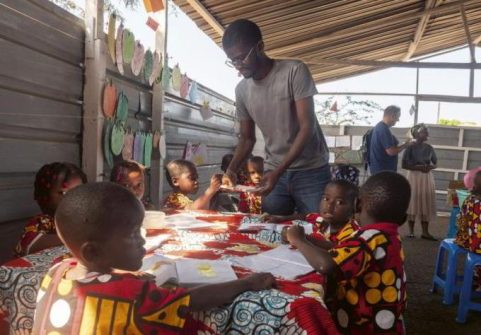
Children’s school run by the Vincentian lay missionaries
In addition to education, these classrooms are “a tool to take care of the children,” says Virginia Alfaro. Every day at 10 a.m., the children receive a good meal, and throughout the week other aspects of hygiene and cleanliness are taken care of. On Thursdays, for example, the teachers check the children’s fingernails to make sure they are clean. If they are not, they are sent home. This is another way of building bridges with the families and making them responsible for their children.
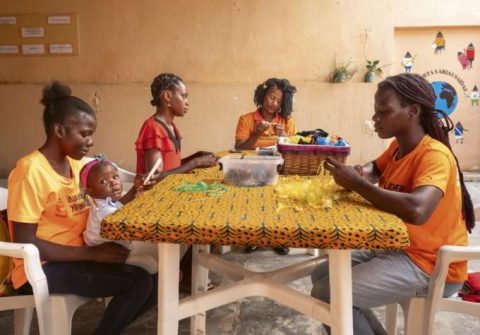
Young women taking part in a training programme for the Ondjango Yapongololi project
Another MISEVI project in Lobito is called Ondjango Yapongololi, which could be translated as “Meeting place for innovators”. It started as a leisure club for weekends and holidays, but since 2019 it has consolidated as a training centre for young leaders.
Entrepreneurship courses with microcredit grants, leadership courses and many others have been introduced: English, piano and singing, design, tailoring, art and culture… It is interesting to note, as Virginia Alfaro points out, that “during the pandemic, we have seen extensive growth because while the institutes and educational centres remained closed, ours was open and many young people were able to meet us”. The participants in the different courses are students from different institutes in Lobito with whom they collaborate from Ondjango Yapongololi. (Open Photo: Patients wait to be seen at the Daughters of Charity clinic in the Kassai neighbourhood of Lobito.)
Enrique Bayo
Photos: José Luis Silván Sen



